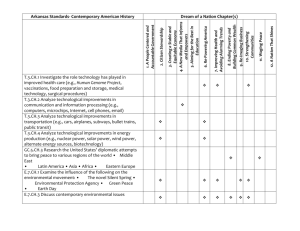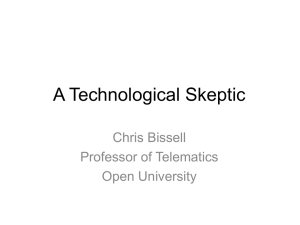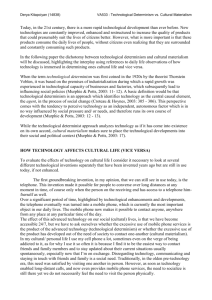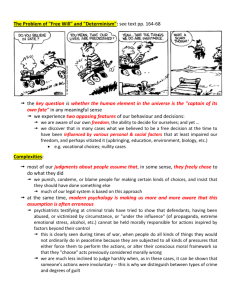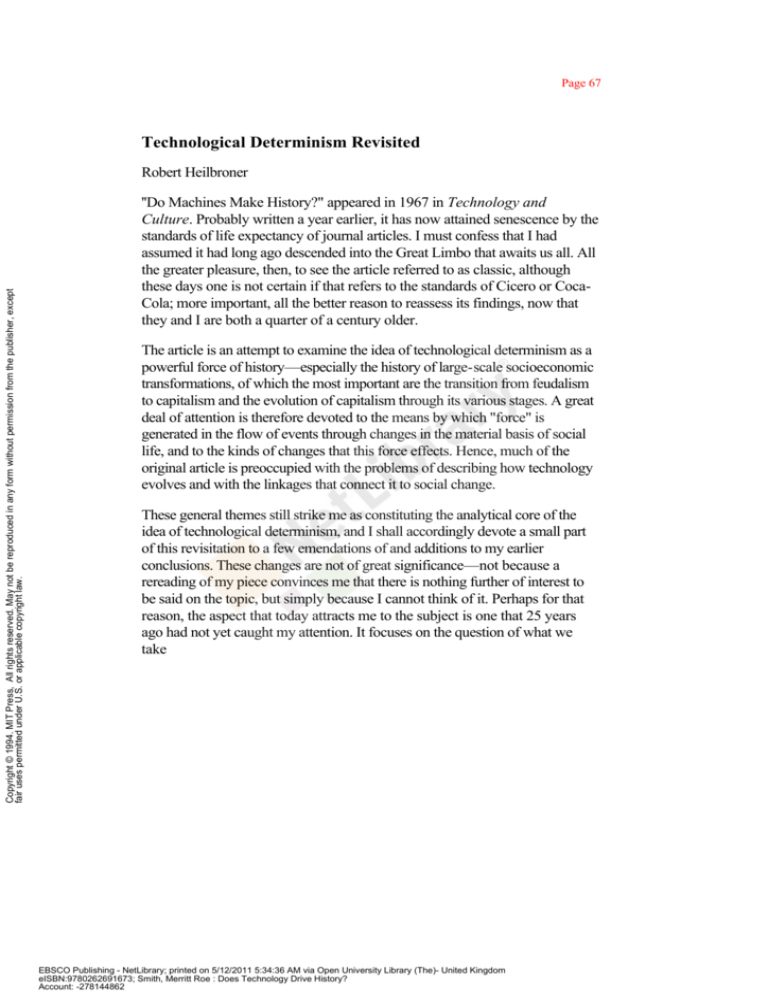
Page 67
Technological Determinism Revisited
Copyright © 1994. MIT Press, All rights reserved. May not be reproduced in any form without permission from the publisher, except
fair uses permitted under U.S. or applicable copyright law.
Robert Heilbroner
''Do Machines Make History?" appeared in 1967 in Technology and Culture. Probably written a year earlier, it has now attained senescence by the
standards of life expectancy of journal articles. I must confess that I had assumed it had long ago descended into the Great Limbo that awaits us all. All the greater pleasure, then, to see the article referred to as classic, although these days one is not certain if that refers to the standards of Cicero or Coca­
Cola; more important, all the better reason to reassess its findings, now that they and I are both a quarter of a century older.
The article is an attempt to examine the idea of technological determinism as a powerful force of history—especially the history of large­scale socioeconomic transformations, of which the most important are the transition from feudalism to capitalism and the evolution of capitalism through its various stages. A great deal of attention is therefore devoted to the means by which "force" is generated in the flow of events through changes in the material basis of social life, and to the kinds of changes that this force effects. Hence, much of the original article is preoccupied with the problems of describing how technology evolves and with the linkages that connect it to social change.
These general themes still strike me as constituting the analytical core of the idea of technological determinism, and I shall accordingly devote a small part of this revisitation to a few emendations of and additions to my earlier conclusions. These changes are not of great significance—not because a rereading of my piece convinces me that there is nothing further of interest to be said on the topic, but simply because I cannot think of it. Perhaps for that reason, the aspect that today attracts me to the subject is one that 25 years ago had not yet caught my attention. It focuses on the question of what we take
EBSCO Publishing - NetLibrary; printed on 5/12/2011 5:34:36 AM via Open University Library (The)- United Kingdom
eISBN:9780262691673; Smith, Merritt Roe : Does Technology Drive History?
Account: -278144862
Page 68
Copyright © 1994. MIT Press, All rights reserved. May not be reproduced in any form without permission from the publisher, except
fair uses permitted under U.S. or applicable copyright law.
"history" to be, and why we are drawn to a technological mode of interpreting its palimpsest.1
That is only metaphor. The substantive problem is why we might be receptive to such a way of construing history. Here I must risk a generalization. It is that the attribute of "modern" historiography that most sharply distinguishes it from "premodern" (I use the terms to refer to styles, not to periods) is its treatment of the background panorama against which the foreground inquiry takes place. In premodern history, that panorama is dominated by inscrutable forces. In the foreground pharaohs and emperors come and go, city­states rise and fall, good
kings follow bad and vice versa, but all the while, behind these adventures and misadventures we espy forces that obey a different causality—the whims of the
gods, the dramas of cosmology and salvationism, or simply the intervention of chance, luck, and the like. "The only thing," writes Collingwood, "that a shrewd
and critical Greek like Herodotus would say about the divine power that ordains the course of history is that . . . it rejoices in upsetting and disturbing things."2
In sharp contrast, the basic premise of modern historiography is that background forces arise from the same kinds of processes, and can be approached and apprehended at the same levels of understanding and explanation, as the objects of immediate scrutiny. This unification of foreground
and background is perhaps most strikingly evident in the rise of an "economic" interpretation of history. From its initial eighteenth­century formulations (I think of Adam Ferguson's Essay on Civil Society) to Marxian materialism, Braudelian stratification, or neoclassical choice theory, the hallmark of modern historical work is an effort to establish filiations between the subject that has been singled out for treatment and the background against which the subject is displayed. Wars and political events, the staple
1. My dictionary (Webster's New Twentieth Century, 1971) tells me that a palimpsest is a "parchment or tablet that has been written upon or inscribed two
or three times, the previous text or texts having been imperfectly erased and remaining, therefore, still visible." That is not a bad description of the writing of history. Technological determinism then becomes a prescription for grinding our lenses, enabling us to make out characters on the parchment that have not previously been seen or understood and thereby to write new texts or to read old ones in new ways.
2. R. G. Collingwood, The Idea of History (Oxford University Press. 1956), p. 22.
EBSCO Publishing - NetLibrary; printed on 5/12/2011 5:34:36 AM via Open University Library (The)- United Kingdom
eISBN:9780262691673; Smith, Merritt Roe : Does Technology Drive History?
Account: -278144862
Page 69
Copyright © 1994. MIT Press, All rights reserved. May not be reproduced in any form without permission from the publisher, except
fair uses permitted under U.S. or applicable copyright law.
subjects of premodern history, are now of interest largely insofar as they embody and concretize background forces such as class struggle and rational maximizing. Indeed, it is characteristic of modern history that the "subject" becomes these very background forces themselves, and that individual figures or events are studied not so much for their intrinsic interest as to illustrate or instantiate the larger processes that interest the historian.
It is here, of course, that technological determinism enters the picture. Indeed, because modern historiography takes for granted that technology, like all background elements, must perforce penetrate the narratives of history­writing,
the question changes from "Do machines make history?" to "How do machines make history?"—a change that opens the way for definitions, boundaries, and argument rather than for polemics or declarations of faith.
Technology and Material Life
Let us then look at some of the ways in which machines make history on the grand scale that interests us here. One such way comes immediately to mind: Machines make history by changing the material conditions of human existence.
It is largely machines (here I use the term to denote both individual mechanisms
and a general level of technological development) that define what it means to live in a certain epoch—at least, as an economic historian might define life. Elsewhere in this volume, Rosalind Williams points out that such an economics­
oriented viewpoint not only begs serious questions but also establishes powerful agendas. I shall deal with that problem before I am done, but it is useful to begin by considering the intimate and pervasive engagement of machinery with everyday life.
A paradoxical aspect of this interconnection is that the engagement is, at the same time, the most immediately apparent example of how machines make history and the least satisfactory example of what we might mean by technological determinism. I shall spend only a few words on the first part of this assertion. If we wish to study a society unfamiliar to us, the best place to start is by grasping its material life. To understand the historical significance of Eileen Power's peasant Bodo, of Mantoux's Arkwright, or of Marx's Moneybags we must first become acquainted with the material circumstances of their lives. In the same way, an understanding of the events of contemporary
history takes for granted a knowledge of the technological setting
EBSCO Publishing - NetLibrary; printed on 5/12/2011 5:34:36 AM via Open University Library (The)- United Kingdom
eISBN:9780262691673; Smith, Merritt Roe : Does Technology Drive History?
Account: -278144862
Page 70
Copyright © 1994. MIT Press, All rights reserved. May not be reproduced in any form without permission from the publisher, except
fair uses permitted under U.S. or applicable copyright law.
that shapes modern­day existence as the mountains and the sea shaped life in the premodern Mediterranean.
Yet such study does not answer the question of how machines make history. A
recognition that the technological structure is inextricably entwined in the activities of any society does not shed light on the connection between changes
in that structure and changes in the socioeconomic order.3 Of course we would
expect that the transition from feudalism to capitalism was profoundly connected with the rise of a new level of technological capability. But precisely what does "profoundly" mean? That is the question to which technological determinism promises to yield an elucidation, which is perhaps the closest thing
to an answer that the question permits. Lacking such an elucidation, we cannot give any kind of analytic account of the manner in which changes in machines alter daily life. Hence, we may be tempted to depict the meaning of technological determinism as the ascription to machines of "powers" they do not have. This leads to impressive­sounding but ultimately unsupportable statements, such as Veblen's assertion that "the machine throws out anthropomorphic habits of thought" and Marx's expectation that the introduction of the railway into India would "dissolve" the caste system.4
The challenge, then, is to demonstrate that technology exerts its effects in generalizable ways. If technological determinism is to become a useful overlay for history's palimpsest, it must reveal a connection between "machinery" and "history" that displays lawlike properties—a force field, if we will, emanating from the technological background to impose order on human behavior in a manner anal­
3. The recognition does, however, raise the important question of whether technology is itself a background or a foreground element. The answer depends
on what we are seeking to investigate. If our interest lies in the sources of technological change itself, as in Joel Mokyr's book The Lever of Riches (Oxford
University Press, 1990), technology becomes the foreground element on whose development impinge forces emanating from the socioeconomic background. If the dynamics of social formations themselves lie at the focal point of inquiry, the placements are reversed, and we seek causal factors in the technological background. It is the latter perspective that is normally associated with technological determinism.
4. Thorstein Veblen, The Theory of Business Enterprise (Scribners, 1932), p. 310. Marx from Michael Adas, Machines as the Measure of Men: Science, Technology, and Ideologies of Western Dominance (Cornell University Press, 1989), p. 240.
EBSCO Publishing - NetLibrary; printed on 5/12/2011 5:34:37 AM via Open University Library (The)- United Kingdom
eISBN:9780262691673; Smith, Merritt Roe : Does Technology Drive History?
Account: -278144862
Page 71
Copyright © 1994. MIT Press, All rights reserved. May not be reproduced in any form without permission from the publisher, except
fair uses permitted under U.S. or applicable copyright law.
ogous to that by which a magnet orders the behavior of particles sprinkled on a
sheet of paper held above it or that by which gravitation orders the paths of celestial objects.
Is there such a force field? It is not difficult to find candidates for its order­
bestowing task. Whitehead credited "routine," without which "civilization vanishes." Many have located the source of behavioral regularity in "human nature," variously described: Hume said that human motivation was a kind of repeating decimal in history.5 For our purposes, what is lacking in these principles is an ability to translate the stimuli emitted by a changing technology into behavioral responses of a predictable kind with regard to transformations of a socioeconomic order. Routine will not serve that purpose; it tells us only that technological change will be resisted, not the form that resistance will take.
Human nature fails for the same reason, even when it is reduced to its constitutive drives—aggression, self­preservation, or whatever—because we have no way of generalizing about the effects of technological change on these drives or about the effects of changes in the drives on the social framework.
What is needed, in other words, is a mechanism of a near­alchemical kind. A huge variety of stimuli, arising from alterations in the material background, must
be translated into a few well­defined behavioral vectors. There must be a systematic reduction of complexity of cause into simplicity of effect, enabling us
to explain how the development of new machineries of production can alter the
social relationships constitutive of feudalism into those of capitalism, or those of
one kind of capitalism into those of another kind. Such a mechanism seems impossible to imagine. What is perhaps even more imagination­defying is that it
exists.
Economics as Force Field
The mechanism is, of course, economics, in the sense of a force field in which a
principle of "maximizing" imposes order on behavior in a fashion comparable to
the magnet and the gravitational pull of the sun. I shall consign to a note the meaning of the vexed term I have put into quotes. For our purposes, it will be sufficient to describe it in Adam Smith's straightforward formulation: "bettering our condi­
5. Alfred North Whitehead, Adventures of Ideas (Macmillan, 1933), p. 113; Hume, An Enquiry Concerning Human Understanding, section V, part 1.
EBSCO Publishing - NetLibrary; printed on 5/12/2011 5:34:37 AM via Open University Library (The)- United Kingdom
eISBN:9780262691673; Smith, Merritt Roe : Does Technology Drive History?
Account: -278144862
Page 72
Copyright © 1994. MIT Press, All rights reserved. May not be reproduced in any form without permission from the publisher, except
fair uses permitted under U.S. or applicable copyright law.
tion [by] an augmentation of fortune."6 This rough­and­ready description, for which "acquisitive mindset" is perhaps a more precise equivalent, is enough to reduce the varied stimuli of changes in the material environment to well­
specified behavioral results.
At the risk of belaboring the obvious, economics accomplishes this remarkable
feat by ignoring all effects of the changed environment except those that affect our maximizing possibilities. In this way, changes in technology, like changes in the weather or in our social situations, are depicted as loosenings or tightenings
of constraints on our behavior, and these altered constraints are then perceived
as changing our actions in sufficiently regularized ways to enable us to speak of
"laws" at work in the marketplace or in the enterprise.
It is not necessary to discuss whether or not this regularized behavioral response can be considered a part of human nature.7 It is enough that the acquisition of fortune becomes a widely noted "rule" of behavior in societies that leave behind the coordinating mechanisms of tradition and command for those of the market. Thus far in history these societies are, in fact, all members of the general social formation we call capitalism. It follows that economic determinism, and its technological correlate, have relevance only in the capitalist social order, in which, as Marx emphasized, the multifarious world of use values is transmuted into a one­dimensional world of exchange values.
In this social order, changes in the technological background are registered in changes in the price system, indicating the directions in which economic activity
can most advantageously move and the forms it can most profitably assume. Thus the force field of maximizing allows us to elucidate how machines make history by showing the
6. Adam Smith, The Wealth of Nations (Modern Library, 1936), pp. 324–325. Maximizing described in terms of utility does not yield an action­directive capable of serving as an operational force field, insofar as utility maximization is tautologous with respect to behavior. Only a Smithian maximization of "fortune"
provides the required specificity of response. Fortunately, this appears to be a reasonable description of economic life, most departures from the rule being self­correcting.
7. For support of this proposition see Jack Hirschleifer, "The Expanding Domain of Economics," American Economic Review (December 1985): 53, or Gary Becker, The Economic Approach to Human Behavior (University of Chicago Press, 1976). For a critique see chapters 1 and 7 of my own Behind the Veil of Economics (Norton, 1988).
EBSCO Publishing - NetLibrary; printed on 5/12/2011 5:34:37 AM via Open University Library (The)- United Kingdom
eISBN:9780262691673; Smith, Merritt Roe : Does Technology Drive History?
Account: -278144862
Page 73
mediating mechanism by which changes in technology are brought to bear on the organization of the social order. This leads in turn to the possibility of applying an analytic understanding to such large­scale social changes as the composition of the labor force and the hierarchical organization of work, not to
mention the dynamics characteristic of economic activity as a whole.
Copyright © 1994. MIT Press, All rights reserved. May not be reproduced in any form without permission from the publisher, except
fair uses permitted under U.S. or applicable copyright law.
Determinism as Heuristic
This immediately raises many questions and some specters. To begin, the triadic connection of technological determinism, economic determinism and capitalism does not mean that technology has no effects on noncapitalist society. The stirrup exerted a "catalytic" impact on the socioeconomic organization of Carolingian society, as did the spread of iron weapons from 1200 to 800 B.C. and the advent of printing in the fifteenth century. The difference is that precapitalist technological impingements do not affect their societies with the "logic" that comes only with capitalism's translation of use values into exchange values. The impact of precapitalist technical change therefore appears more contingent, less open to systematic elucidation, than when an economic force field guides its applications and consequences. We can say many more things about the "path" of technical change in the United States in the nineteenth century than about its course in ancient China or the Roman empire.8 Perhaps there are other logics that would enable us to describe the interaction of technical change and social consequence with the degree of predictability and precision that is the very identifying characteristic of economics, but we do not know them.
Next, I hasten to add that in elevating economic determinism to the rank of a tutelary deity within capitalism, I am not asserting that economics is thereby entitled to assume the rank of the queen of the social sciences. I believe that what we call economic behavior is best understood as the sublimated expression of much deeper­rooted elements of "political" and "social" behavior—dominance and obedience—which can, in turn, be traced to the human experience of
8. Compare Ross Thompson, The Path to Mechanized Shoe Production in the United States (University of North Carolina, 1989), and chapters 2 and 9 of Mokyr, The Lever of Riches.
EBSCO Publishing - NetLibrary; printed on 5/12/2011 5:34:37 AM via Open University Library (The)- United Kingdom
eISBN:9780262691673; Smith, Merritt Roe : Does Technology Drive History?
Account: -278144862
Page 74
Copyright © 1994. MIT Press, All rights reserved. May not be reproduced in any form without permission from the publisher, except
fair uses permitted under U.S. or applicable copyright law.
protracted childhood dependency.9 Nonetheless, what is important is that "economic" behavior—that is, behavior motivated by the pursuit of exchange value—is set analytically apart from and above behavior motivated by other considerations, because it manifests a degree of orderliness absent from "political" or "sociological" activities. It may be that politics and sociology contain their own laws—I think of Alphonse Karr's "Plus ça change, plus c'est la même chose" and Lord Acton's pronouncements about the corrupting tendencies of power. Unlike economic behavior, however, these generalizations do not give us the translation mechanism of economics, enabling
us—to take the present instance—to speak systematically about how machines
will bring pressures to bear on socioeconomic formations.
Finally, technological determinism does not imply that human behavior must be deprived of its core of consciousness and responsibility. It avoids this trap insofar as it offers a heuristic of investigation, not a logic of decision­making. As such a heuristic, it presents a premise from which we can initially approach the interpretation of socioeconomic events, not an infamous "last instance" by which we are forced ultimately to resolve it. The premise is that living behavior is not random or chaotic, but marked by undeniable, although imprecise regularities: "undeniable" because predictable behavior is the basis on which all social life is raised; "imprecise" not only because there are obvious variances in behavior from one social entity to the next, but also because there exists a margin of behavioral indeterminacy within any given individual. Technological determinism then goes on to posit that the acquisitive mindset is a regular and dependable motive for behavior, at least in market­coordinated societies. Combining this persistent general drive and the margins of freedom characteristic of its concrete expression, we arrive at the formulation of a "soft determinism" which, however paradoxical to the philosopher, should present no great difficulties to the historian.
Degrees of Determinism
It is time to place these rather abstract considerations into more concrete perspective. Alfred Chandler's recent survey of American, British, and German
capitalism during the period 1919–1948 pro­
9. Robert Heilbroner, The Nature and Logic of Capitalism (Norton, 1985), pp. 46–52.
EBSCO Publishing - NetLibrary; printed on 5/12/2011 5:34:37 AM via Open University Library (The)- United Kingdom
eISBN:9780262691673; Smith, Merritt Roe : Does Technology Drive History?
Account: -278144862
Page 75
Copyright © 1994. MIT Press, All rights reserved. May not be reproduced in any form without permission from the publisher, except
fair uses permitted under U.S. or applicable copyright law.
vides a useful case in point.10 Chandler's immediate interest is directed to explaining how the structures of capitalism were shaped by managerial styles that he describes as Competitive (American), Personal (British), and Cooperative (German). These styles, in turn, are shown to reflect underlying sociopolitical elements—what we might be tempted to call the respective "national characters" of the three nations. Chandler's important contribution is to point out how these differing responses to a common problem of industrial dynamics affected the developmental paths (and today, the development prospects) of the three nations.
This is an enlightening means of exploring the relation of technological and economic determinism, and the degrees of hardness and softness of these order­bestowing principles, although I hasten to add that these are my characterizations and not Chandler's. Chandler shows how the introduction of high­speed, continuous­run, capital­intensive machines led to a number of quite
different, even mutually contradictory, institutional changes. Here is where technological determinism supplies many elucidations. The first is that the physical characteristics of the machinery of mass production can be discerned as the material cause of the phenomenon that Chandler is examining. These characteristics are not, however, the efficient cause. That lies in the translation of the engineering consequences of mass production into the economic stimuli of large changes in cost per unit of production—a translation that makes visible
the force field of maximization to which activity is exposed in the market sphere
of capitalism.
This is the "deterministic" aspect of the elucidation, and if that were all there were to it, we would expect that managements in all industrial capitalisms would respond in similar fashion. Now the equally important soft considerations enter, for the dramatic economies of scale and scope can be interpreted as opening new possibilities for—or new dangers from—corporate
expansion. As Chandler shows, this makes way for a range of institutional responses, each a maximizing answer to the perceived economic situation. In this way, softness combines with hardness to throw analytic light on the different ways in which machines can influence the socioeconomic
10. Alfred D. Chandler, Jr., Scale and Scope: The Dynamics of Industrial Capitalism (Harvard University Press, 1990).
EBSCO Publishing - NetLibrary; printed on 5/12/2011 5:34:37 AM via Open University Library (The)- United Kingdom
eISBN:9780262691673; Smith, Merritt Roe : Does Technology Drive History?
Account: -278144862
Page 76
framework, even though all are obeying a common economic imperative.
Copyright © 1994. MIT Press, All rights reserved. May not be reproduced in any form without permission from the publisher, except
fair uses permitted under U.S. or applicable copyright law.
Needless to say, this view of technological determinism is far removed from any kind of mechanical linkage. For instance, even where the specific characteristics of technology give rise to well­defined matrices of inter­industry connections, these linkages may not guide the course of economic growth if certain "soft" political and social preconditions are absent. Marx seems to have
overlooked this possibility in speaking about the consequences of railroadization for India:
. . . when you have once introduced machinery into the locomotion of a country,
which possesses iron and coal, you are unable to withhold it from its fabrication. You cannot maintain a net of railways over an immense country without introducing all those industrial processes necessary to meet the immediate and current wants of railway locomotion and out of which there must grow the application of machinery to those branches of industry not immediately connected with railways. The railway system will become, in India, truly the forerunner of modern industry.11
Here Marx is talking about the railroad as an apparatus whose backward and forward linkages would eventually force a leap from one level of technological capability to another. Yet historical experience, not least that of India, has shown us that the logic of industrial linkage loses its peremptory force in determining the developmental path of a nation entangled in a preexisting global
division of industry. The failure of centrally planned economies to duplicate the performance of capitalist economies is perhaps even more illustrative of such soft considerations. The history of Soviet industrialization has shown that technology is the servant and not the master of its associated system of sociopolitical directives, and that the use of more or less identical kinds of lathes, presses, or assembly­line configurations in centralized planning systems and in capitalist market systems will not result in anything like identical growth paths or performance levels.12
Indeed, if there is any substantial recantation that 25 years of observation has enjoined on me, it is to withdraw my earlier inclusion of "low socialism" along with high capitalism as a setting in which it would be possible to explain, even to foresee, the broad socioeco­
11. From Adas, Machines as the Measure of Men, p. 240.
12. See Nikolai Shmelev and Vladimir Popov, The Turning Point: Revitalizing the Soviet Economy (Doubleday, 1989).
EBSCO Publishing - NetLibrary; printed on 5/12/2011 5:34:37 AM via Open University Library (The)- United Kingdom
eISBN:9780262691673; Smith, Merritt Roe : Does Technology Drive History?
Account: -278144862
Page 77
nomic consequences flowing from changes in the machinery of production. I had assumed that low socialism meant a society that still embraced—and was still embraced by—capitalist­like motivations. In the absence of that premise, the application of technological—and, of course, of economic—determinism to
the developmental tendencies of any form of socialism seems extremely uncertain.
Copyright © 1994. MIT Press, All rights reserved. May not be reproduced in any form without permission from the publisher, except
fair uses permitted under U.S. or applicable copyright law.
The Bed of Procrustes
After so much has been taken away, what remains of technological determinism as a perspective from which we can consider how machines make
history, always bearing in mind the socioeconomic meaning we attach to the last word in the question?
• Technological determinism gives us a framework of explication that ties together the background forces of our civilization, in which technology looms as an immense presence, with the foreground problem of the continuously evolving social order in which we live. The tie between the two is far from definitive, complete, or unambiguous, but it is the only such connection that we can make. As such, it has deep appeals to the modern temper, which recoils from introducing unknowability into the course of events. The deterministic view does not foreclose on a margin of indeterminacy (in some cases a very large margin), but its active search for regularities in, and lawlike aspects to, historical change remains the most powerful unifying capability we have. Whatever compression we may thereby suffer in our conceptions of ourselves as actors in history seems to me far less than would be felt if the very idea of a historic orderliness were shown to be utterly without basis. History as contingency is a prospect that is more than the human spirit can bear.
• Even in the most dramatic instances of technological determinism, as when we can trace the socioeconomic effects of the factory, the technique of mass production, or the modern­day computer, we can never eliminate the soft causal elements that are always present with, and within, those of the economic
force field itself. Among these soft elements we must place many volitional elements, including most of what we call political decisions, social attitudes, cultural fads and fashions, and those aspects of maximizing itself in which the agent's final determination hinges on time horizons, risk aversion, and similar judgments about which no behavioral generalizations can be
EBSCO Publishing - NetLibrary; printed on 5/12/2011 5:34:37 AM via Open University Library (The)- United Kingdom
eISBN:9780262691673; Smith, Merritt Roe : Does Technology Drive History?
Account: -278144862
Page 78
Copyright © 1994. MIT Press, All rights reserved. May not be reproduced in any form without permission from the publisher, except
fair uses permitted under U.S. or applicable copyright law.
made. Hence the clarifying power of determinism, even at its greatest, must always allow for some degree of uncertainty. This is perhaps only tantamount to saying that our conceptions of ''history" cannot embrace either a fully determined or a wholly undetermined narrative of events—a state of affairs that
no doubt reveals more about our psychological limitations than about the actualities of historical sequence, whatever they may be.
• Rosalind Williams protests that a deterministic heuristic, however soft, involves us in a cramping view of history's palimpsest, throwing aside much of its endlessly rich interpretational receptivity in favor of the thin stuff of behavioral "laws" and socioeconomic "formations."13 I am very sympathetic to her denunciation of economism as a Procrustean approach to historical understanding, and no friend of the pretensions of economics to be a "universal
science."14 Disapproval is one thing, however; disavowal another. We live in a social order in which an economic calculus takes precedence over, and enters into the definitions of, many aspects of life. In the land of Procrustes, the standards of the innkeeper are those that apply. As long as economics constitutes the most powerful and pervasive motivational force, and the only one to which behavioral regularities can be ascribed, a perspective of soft determinism seems to me the one most likely to enable us to grasp the processes of history in which we are entangled.
Acknowledgement
I would like to thank Ross Thompson for his extremely valuable criticism.
13. These are my terms of derogation, but I think they catch her drift.
14. See my "Analysis and Vision in the History of Modern Economic Thought," Journal of Economic Literature (September 1990): 1111–1113, and "Economics as Ideology," in Economics as Discourse, ed. W. J. Samuels (Kluwer­Nijhoff, 1990).
EBSCO Publishing - NetLibrary; printed on 5/12/2011 5:34:37 AM via Open University Library (The)- United Kingdom
eISBN:9780262691673; Smith, Merritt Roe : Does Technology Drive History?
Account: -278144862

